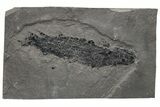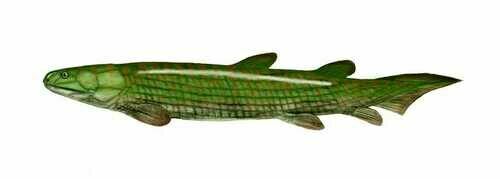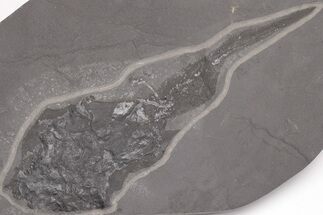5.3" Devonian Lobe-Finned Fish (Osteolepis) Pos/Neg - Scotland
This is a beautifully preserved, 5.3" long (straightline measurement) specimen of the Early Devonian, "Lobe-Finned" fish, Osteolepis macrolepidotus. It was collected from the Sandwick Fish Beds in the Old Red Sandstone in the Orkney Isles of Scotland. Both the positive and negative split are included! Each half comes with an acrylic display stand.
About Osteolepis
Osteolepis ('bone scale') is an extinct genus of lobe-finned fish from the Devonian period. It lived in the ancient Lake Orcadie of northeastern Scotland. Osteolepis averaged about 20 centimeters (7.9 inches) long, and was covered with large, square scales. The scales and plates on its head were covered in a thin layer of spongy, bony material called cosmine. This layer contained canals connected to sensory cells deeper in the skin and ended in pores on the surface: they were probably for sensing vibrations in the water.
Osteolepis was a rhipidistian with a number of features in common with tetrapods (land-dwelling vertebrates and their descendants). They were likely close to the base of the tetrapod family tree.
About Lake Orcadie
Lake Orcadie was a vast, freshwater lake that existed during the Devonian period, roughly 390 million years ago, in what is now northern Scotland, the Orkney Islands, and parts of the Moray Firth region. Part of the larger Old Red Sandstone continent, this ancient lake lay within a rift basin created by tectonic activity following the Caledonian orogeny. Its environment fluctuated between shallow lake margins and deeper basins, with sediments accumulating over millions of years, forming finely laminated shales and sandstones that now preserve an extraordinary fossil record. These deposits reveal not only a dynamic landscape shaped by climatic shifts but also a rich ecosystem teeming with early vertebrate life.
The fauna of Lake Orcadie included some of the earliest jawless and jawed fish known to science. Among them were agnathans like Cephalaspis and armored placoderms such as Coccosteus and Bothriolepis. These fish swam through waters that were periodically oxygen-poor, contributing to the exceptional preservation of their remains in anoxic sediments. Lake Orcadie also supported early lobe-finned fish like Osteolepis, a key genus in the evolutionary lineage leading toward tetrapods. Invertebrates were scarce in the fossil record, likely due to the brackish or fluctuating conditions of the lake, but stromatolite structures and microbial mats suggest microbial life flourished. Altogether, Lake Orcadie provides a snapshot of a pivotal time in Earth's history—when vertebrates were beginning to diversify and adapt to new ecological niches within freshwater habitats.
Osteolepis ('bone scale') is an extinct genus of lobe-finned fish from the Devonian period. It lived in the ancient Lake Orcadie of northeastern Scotland. Osteolepis averaged about 20 centimeters (7.9 inches) long, and was covered with large, square scales. The scales and plates on its head were covered in a thin layer of spongy, bony material called cosmine. This layer contained canals connected to sensory cells deeper in the skin and ended in pores on the surface: they were probably for sensing vibrations in the water.
Osteolepis was a rhipidistian with a number of features in common with tetrapods (land-dwelling vertebrates and their descendants). They were likely close to the base of the tetrapod family tree.
About Lake Orcadie
Lake Orcadie was a vast, freshwater lake that existed during the Devonian period, roughly 390 million years ago, in what is now northern Scotland, the Orkney Islands, and parts of the Moray Firth region. Part of the larger Old Red Sandstone continent, this ancient lake lay within a rift basin created by tectonic activity following the Caledonian orogeny. Its environment fluctuated between shallow lake margins and deeper basins, with sediments accumulating over millions of years, forming finely laminated shales and sandstones that now preserve an extraordinary fossil record. These deposits reveal not only a dynamic landscape shaped by climatic shifts but also a rich ecosystem teeming with early vertebrate life.
The fauna of Lake Orcadie included some of the earliest jawless and jawed fish known to science. Among them were agnathans like Cephalaspis and armored placoderms such as Coccosteus and Bothriolepis. These fish swam through waters that were periodically oxygen-poor, contributing to the exceptional preservation of their remains in anoxic sediments. Lake Orcadie also supported early lobe-finned fish like Osteolepis, a key genus in the evolutionary lineage leading toward tetrapods. Invertebrates were scarce in the fossil record, likely due to the brackish or fluctuating conditions of the lake, but stromatolite structures and microbial mats suggest microbial life flourished. Altogether, Lake Orcadie provides a snapshot of a pivotal time in Earth's history—when vertebrates were beginning to diversify and adapt to new ecological niches within freshwater habitats.
$595
SPECIES
Osteolepis macrolepidotus
LOCATION
Cruaday Hill Quarry, Orkney Isles, Scotland
FORMATION
Old Red Sandstone
SIZE
5.3" long (straightline) on 6.7 x 4" limestone
CATEGORY
SUB CATEGORY
ITEM
#217956
We guarantee the authenticity of all of our specimens.
 Reviews
Reviews
















